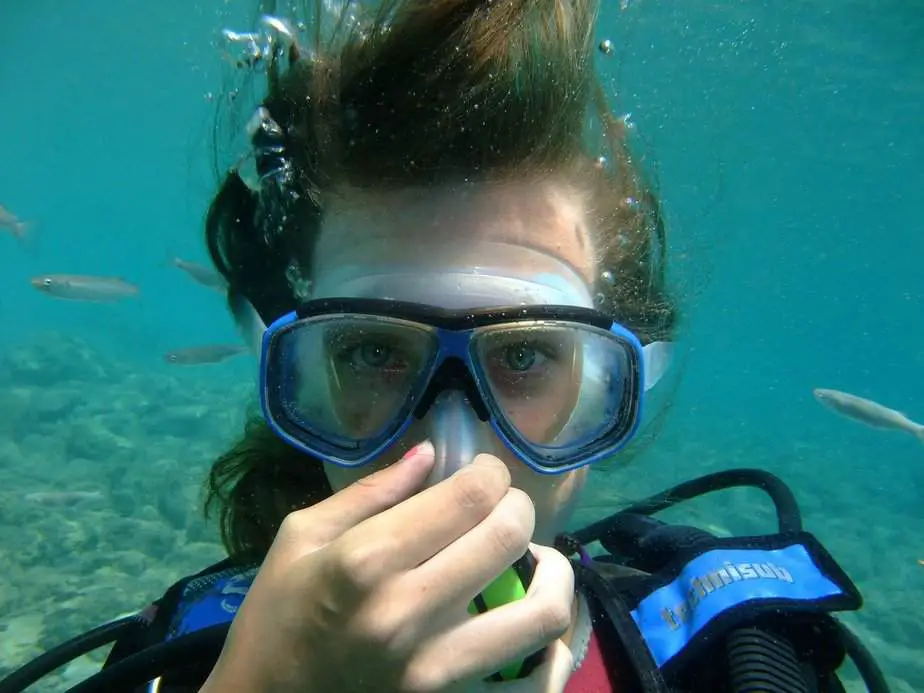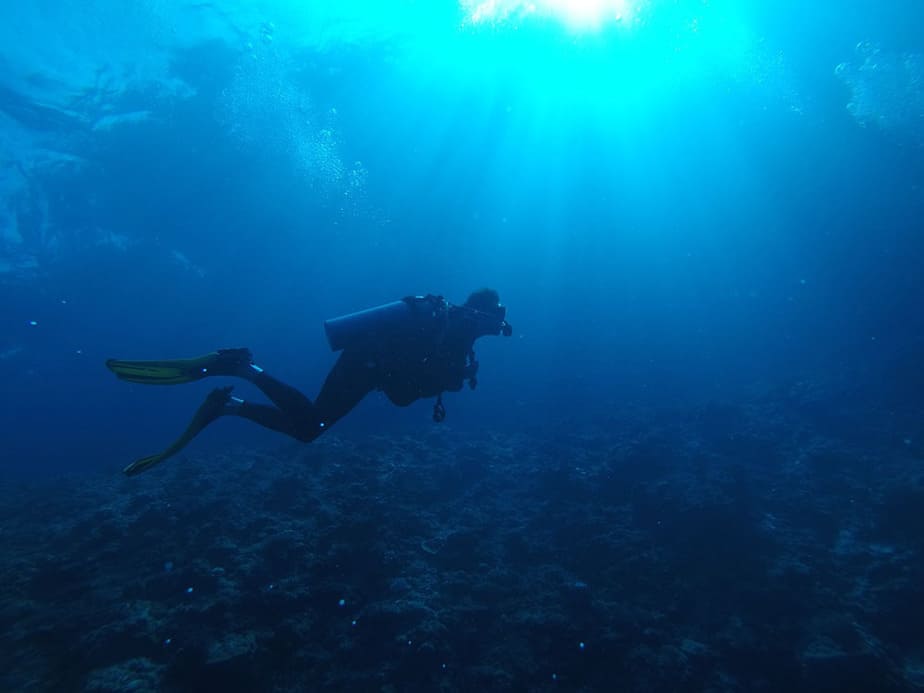There are a few reasons why you might be reading this article. Perhaps you’re considering taking up scuba diving and are doing your due diligence about potential problems that can occur. Or perhaps you’re on vacation, sitting in the hotel and missing out on the day’s dive because of ear problems. Whether your ear has an infection or is clogged up, in this article, we provide some tips to help you deal with your ear pain.
What causes ear pain while scuba diving
Ear infection
Did you know that Otitis Externa, the medical name for Swimmer’s Ear, isn’t caused by water entering your ear? That doesn’t tell the whole story; the main issue is when water enters the ear canal and stays there for a prolonged period of time, allowing the bacteria to grow and cause an infection.
Typically, your ear has some natural protection against swimmer’s ear in the form of earwax. Earwax often gets a bad rap. People usually think of earwax as something that should be removed otherwise it’ll clog your ears. In this particular situation, earwax acts as a layer of defense to protect your ear canal from damage and makes it difficult for germs to penetrate the skin.
With that said, when water is allowed to remain in your ears, it causes the skin cells to swell and pull apart, leaving gaps for bacteria to get under your skin. Here, it is the ideal environment for them to multiply like crazing, resulting in an ear infection. This is different from the ear infections you might get after a cold.
If left untreated, you may experience itchiness, pus or fluid draining from the ear, pain, and loss of hearing. The infection can also spread to your lymph nodes, making it painful to move your jaw. Once you have an ear infection, you should refrain from diving and see a doctor who will likely prescribe you with antibiotics to treat it.
Ear barotrauma
Another cause of ear pain while scuba diving is ear barotrauma. The deeper you dive, the more the water pressure increases. This can cause discomfort and eventually pain in your ear unless you equalize the pressure.
Think back to a time when you were at a high altitude such as on a mountain or on a flight. You may remember your ear feeling a strange pressure before it eventually “popped.” After the pop, the pressure in your ears was gone, and that’s because the pop was the sound of air flowing from your throat to your middle ears through your Eustachian tubes. Equalization is all about opening the Eustachian tubes to decrease the pressure in your ears.
If you fail to equalize your ears, the mounting pressure will cause further pain and may eventually rupture your eardrums. Common scuba diving wisdom is to equalize early and often to prevent ear barotrauma.
When you encounter difficulty equalizing your ears, stop your descent immediately. Keep trying to equalize, and consider ascending a meter to decrease the water pressure and make it easier to equalize. Do not wait until you feel pain to equalize. Do not try to push past the pain. If you are having trouble equalizing, you should abort the dive.
The most common equalization technique is the Valsalva maneuver. You probably already know about this. It’s when you pinch your nose and then exhale until your ears have cleared.
There are some downsides to the Valsalva maneuver, the first of which is that it requires one hand to perform. Another problem is that this technique only presses air against the Eustachian tubes. If you dive too deep without equalizing early enough, the pressure can make it difficult to force air through the Eustachian tubes. If you keep descending while trying to forcefully equalize, you can also cause ear barotrauma this way.
When performing the Valsalva maneuver, you must remember to exhale through your nostrils very slowly and gently. You should not be forcefully exhaling. Some other techniques you can try are:
- Toynbee maneuver: Hold your nose and swallow simultaneously.
- Yawn and swallow: Thrust your lower jaw forward, open your mouth slightly, and swallow while keeping your lips pursed around the regulator.
- Head tilt: Tilt your ear upwards to try to stretch the openings of the eustachian tubes.
You can learn more advanced equalization techniques in this article.
Tips to prevent ear barotrauma

Equalize early and often
Don’t wait until you feel pain to equalize. As soon as you feel pressure building up, equalize. The first time you equalize will be while you’re still on land. Early on during the descent, you may have to equalize as often as once every 3 ft (1 m). In fact, on every exhale, you can just use some of it to clear your ears.
Just to be safe, you should just equalize randomly sometimes even if you don’t feel any pressure in your ears. It’s just a good habit to equalize often. Drill this habit into your brain until it’s something you just subconsciously do. That way, you’ll never have to worry about if you’ve equalized or not.
Descend slowly
A general rule in scuba diving is to descend and ascend slowly. Rushing things just increases the risk of something going wrong. If you know you have trouble equalizing, for instance, let your dive buddy or instructor know before the dive so that they can accommodate your slow descent.
Descending slowly is necessary in case you have difficulties with equalizing. If you failed to equalize at your current depth, stop your descent and ascend 3 feet (1 m) to depth with slightly lower pressure and try equalizing there. If you cannot equalize, then abort your dive. Descending too quickly can cause the pressure to increase too quickly, making it difficult to equalize, so do it slowly and carefully.
Don’t dive with a cold or congestion
If you’re feeling under the weather, don’t dive. It’s common sense, but many people on vacation feel they are wasting their vacation by recuperating in the hotel. However, would you rather miss a dive or rupture your eardrums? When you are congested and subjecting yourself to the water pressure, it will be difficult if not impossible to equalize the pressure in your ears.
Furthermore, being sick can cause you to feel dizzy and weak. You may not be able to make rational decisions like you normally would, and this is just dangerous in general. You can also spread your cold to everybody on the boat. Either way, it’s just a bad idea all-around.
How to get rid of blocked ears after diving
Sometimes after a scuba dive, you may find some stubborn water just won’t exit your ear canals. It should be pretty obvious when your ears are clogged; even if you can’t feel the water droplet, you’ll certainly be able to tell that sounds from the clogged ear sound muffled or there is a “whooshing” sound when you move. To unclog your ears, follow these tips:
The first and most obvious is to take advantage of gravity. Tilt your head to the side of the clogged ear. Gently pull on the earlobe to straighten the ear canal so the water can more easily flow out. You can even jump up and down to do this; it may seem a little silly, but it works. Just be careful not to fall because you are a little off balance.
The second method you can try is to put a blowdryer on at the lowest setting, hold it at least a foot away from your clogged ear while using your free hand to gently pull down your earlobe, and try to dry the water. You can also specifically purchase an ear dryer to more easily perform this task.
Lastly, you can resort to over-the-counter ear drying drops. How it works is the solution contains isopropyl alcohol and anhydrous glycerine which are drying agents; they cause the water in your ear canal to evaporate faster which drastically reduces the chances of ear infection.
If you’d rather not purchase any products, you can try mixing your own DIY ear drying solution. What you need is an even 50/50 split of white vinegar and rubbing alcohol. Pour this mix into your ear, let it sit for a minute or so, then pour it out.
The alcohol will evaporate the water, and the white vinegar balances the pH of your ear canal so that bacteria and fungus struggle to grow. The downside is that your ears will smell like a salad mix, but at least they’ll be dry and clean.
Some guides recommend you to use hydrogen peroxide for your ears. It is generally safe for your ears at low concentrations, however at concentrations over 10%, can cause blistering, inflammation, and ear aches. Do not use any ear drops if you recently had ear surgery or have a damaged ear drum.
Can you wear ear plugs for scuba diving?

After learning about how ear infections occur, many well-meaning newbies come to the conclusion that they should wear ear plugs to prevent water from entering their ear canal, thereby avoiding ear infections. Unfortunately, ear plugs cause more problems than they solve.
Ear plugs may hypothetically protect you from ear infections, but they put you at increased risk of suffering ear barotrauma. As we mentioned, ear barotrauma can occur when you cannot equalize the pressure in your inner ear.
When you shove an ear plug in your ear canal, it actually traps a tiny bit of air inside between the plug and your ear drums. This air will be subject to the water pressure but will have no place to go. Since your ears are plugged up, you cannot equalize, and therefore the resulting increase in pressure can cause ear barotrauma.
To avoid this, special scuba diving ear plugs called vented ear plugs were created. The most popular ones are No products found.. Vented ear plugs have a built-in valve which allows air and water to escape so that you can successfully equalize. These ear plugs will make the increase in water pressure feel smoother and keeps water from constantly flushing in and out of the ear canal.
With that said, water will get past the vented ear plugs so you’ll need to apply some ear drying methods after a dive to prevent ear infections. Learn more about ear plugs for scuba diving by reading this article.
Does scuba diving damage your ears?
The answer is it depends. Scuba diving is an extreme sport, and therefore it has inherent risks such as suffering from ear infection or ear pain, among others. Scuba diving may seem extremely intimidating at first, however by taking the Open Water Diver course offered by PADI, NAUI, SSI, or other scuba training agencies, you will learn everything you need to know about equalization.
As long as you are cautious and conscientious about following safety guidelines, then the chances of suffering an ear infection or ear barotrauma are slim. Even if you do suffer an ear infection, it is generally not life-threatening. See your doctor and you will be prescribed antibiotics to treat it.
Last update on 2026-02-17 / Affiliate links / Images from Amazon Product Advertising API

